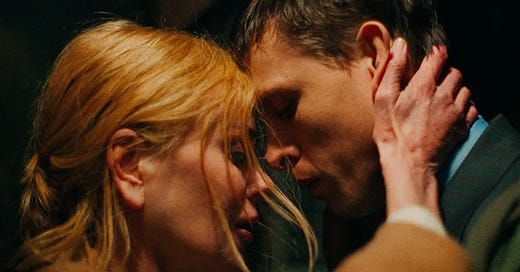Babygirl isn't just a sexy thriller. It's so much more than that.
The glass of milk? The Father Figure dance scene? The wild dog? I have thoughts. Many of them.
This piece contains spoilers. If you haven’t seen Babygirl yet, you might want to save it for later. The full version of this article is available only for my paid subscribers - but (hooray!) there’s currently 40% off all subscriptions until the end of the month. If you’ve enjoyed any of my content on here, please do consider supporting my work. I really, really appreciate it.
So. I went to see Babygirl.
I went on my own, not because I thought I should but because my husband happens to be travelling for work. After the credits rolled, I was glad I’d gone solo. There was so much to digest and work through. All I knew in the immediate aftermath was that I thought Babygirl was brilliant. I needed a few more days to understand why.
Eventually, I knew I’d want to write about it, but I didn’t realise quite how much I’d have to say and now here we are, 2000 words later, and I’m still fizzing like a dissolving aspirin. I haven’t even mentioned the genius of the soundtrack! Or the wardrobe! Or the cinematography! Perhaps I’ll do a dissertation on it?
Until then, let me content myself with stating that, for me, Babygirl wasn’t just a film about sex or glasses of milk or a shirtless Harris Dickinson dancing to George Michael. It was a film about selfhood and the reclamation of power. And if you want more, then here’s my extended take on why you should all go and see it (preferably solo).
*
There’s a scene, about halfway through Babygirl, where Nicole Kidman’s character, Romy, is talking to her husband, Jacob, (played by Antonio Banderas) in their sleek New York apartment. Or rather, he’s talking to her while she is distracted by her phone. Jacob is a successful theatre director; Romy a high-powered CEO of a robotics company. They are sitting at the marbled kitchen island late one night. She’s checking her emails while he’s bemoaning the difficulties of working with a lead actress who is misinterpreting Ibsen’s classic, Hedda Gabler.
‘She thinks it’s about desire,’ Jacob wails. ‘It’s not about desire! It’s about suicide.’
It is, perhaps, ironic that this scene exists slap bang in the middle of a movie that has been marketed as one thing - a steamy thriller - but is, in fact, about something far more meaningful. As Jacob might say: ‘Babygirl is not about sex! It’s about power.’ It’s also about performance, shame, passion, ageing and our capacity for self-denial.
In the feverish build-up to its release, Babygirl has been sold to us as an erotic psychodrama, where a female boss embarks on an illicit BDSM relationship with Samuel, a younger intern (played by Harris Dickinson). Much has been made of the sex and the bit where Romy is ordered to drink a glass of milk by her younger lover and the meme-able scene where Samuel dances to George Michael’s Father Figure wearing little more than a silver chain around his neck (not since Paul Mescal’s necklace in Normal People has a piece of male jewellery created such climactic discourse).
Still, I feel the marketing campaign has done the film a disservice. Of course, it’s sexy and hot and dark and all the things you might expect when you learn that the writer-director, Halina Reijn is a fan of 1990s erotic thrillers like Fatal Attraction and wrote the Father Figure scene as a reference to 9 1/2 Weeks. But, for me, it was less about sex and more about the risks we take when confronted with our most secret, shameful appetites.
In this respect, it bears its own resemblance to Hedda Gabler. Although the point is not belaboured, you become aware of the possible similarities between Hedda and Romy early on. Hedda is a woman trapped in a marriage and a house she does not want. She chafes against social convention and struggles for personal autonomy. Romy, we discover, shares some of these frustrations. Like Hedda, she seems willing to gamble everything in pursuit of her desires. In Babygirl, the question of suicide is more metaphorical than in Hedda Gabler, which ends with the protagonist shooting herself in the head. In Babygirl, we watch to see if Romy’s world will implode when she follows her most primal instincts. Is ending the performance of her life the only way to be free to live a more authentic one? Is Romy killing off the idea of herself in order to create the freedom to truly be herself?
*






